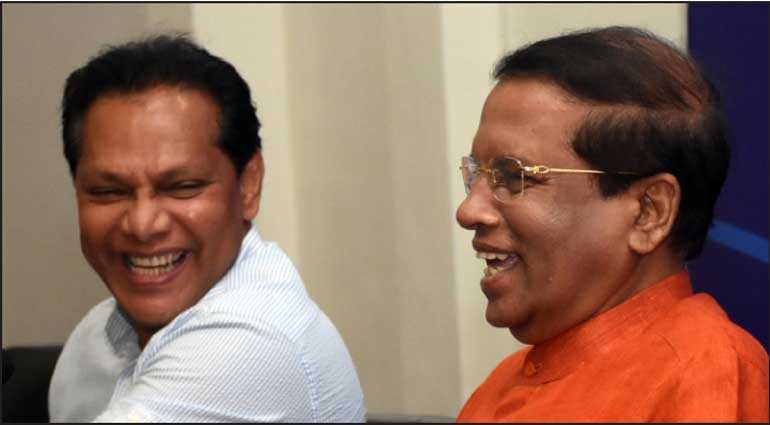Thursday Feb 19, 2026
Thursday Feb 19, 2026
Thursday, 4 June 2020 00:28 - - {{hitsCtrl.values.hits}}

By Nuwan Senarathna
Former President Maithripala Sirisena was yesterday optimistic of winning more seats at the upcoming Parliamentary Elections due to a “non-existent” Opposition but stopped short of saying a two-thirds majority may be in the bag for the coalition.
Chances of winning more seats at the forthcoming General Election were better due to the rift between the United National Party (UNP) and the Samagi Jana Balawegaya (SJB), Sirisena said.
Speaking to reporters at the Sri Lanka Freedom Party (SLFP) head office, Sirisena said his party will fully commit to secure the highest number of seats at the General Election.
Sirisena....
He predicted the rift between the UNP and SJB had discouraged their supporters, who will either pick a new party or stay away from the voting booth altogether.
“What it boils down to is there is no Opposition. The reasons to say that is the main Opposition is split into two groups, and there are lots of internal rivalries happening at the moment. This also frustrated their supporters. Therefore, we have a better chance of winning handsomely,” he said.
Sirisena speculated his coalition will be able to get the highest number of seats in Parliament. However, he declined to answer whether they can reach the two-thirds target.
Further speaking about his relationship with the UNP when he was in office, Sirisena said the rift between him and the UNP arose after his decision to appoint a Presidential Commission of Inquiry into the bond scam.
“The relationship with the UNP was torn apart after I appointed the Commission to investigate the bond scam. I have done everything I could to bring Arjuna Mahendran back to Sri Lanka. I have written to Interpol to issue red notices, but some members in the then-Government thought my decision was based on political interest,” he added.
He noted it was this rift with the UNP that was the reason for him to appoint Mahinda Rajapaksa as the Prime Minister in October 2018, insisting that was done in good faith.
Referring to the 19th Amendment, the former President opined there were mixed outcomes from the Amendment. He acknowledged independent commissions established under the 19th Amendment were positive, but argued Parliament was unable to set up a framework to define their powers and functions clearly.
“The establishment of independent commissions was one of the main positive outcomes of the 19th Amendment. However, the failure to regularise their powers was the issue. I have spoken about this several times when I was in office.”
He pointed out even though the 19th Amendment stated regulations and frameworks should be drafted, they were ultimately not completed, which led to complications over the functions of the Commissions. He conceded the independent commissions would have functioned smoothly if a framework were introduced.
“The Amendment created three leaders. The President, the Prime Minister, and the Speaker. Both the Prime Minister and Speaker were made more powerful. That created lots of challenges. The Speaker got the power to control the Constitutional Council, which controls independent commissions. The Prime Minister also got more power, but the President’s power was reduced,” he reiterated.
Increasing powers of the Prime Minister and the Speaker could lead to internal struggles, which could affect the country’s development, Sirisena contended.